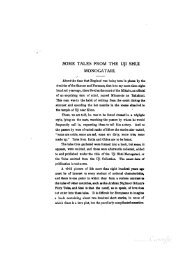Chau Ju-Kua - University of Oregon Libraries
Chau Ju-Kua - University of Oregon Libraries
Chau Ju-Kua - University of Oregon Libraries
You also want an ePaper? Increase the reach of your titles
YUMPU automatically turns print PDFs into web optimized ePapers that Google loves.
INTKODUCTION.<br />
«In the foreign quarter (^ j^) in <strong>Kua</strong>ng-ch6u (Canton) reside all the<br />
people from beyond the seas (y^ ^|.). A foreign head-man (^ ^) is ap-<br />
pointed over them and he has charge <strong>of</strong> all public matters connected with<br />
them. He makes it his special duty to urge upon the foreign traders to send<br />
5 in tribute (to the Chinese court). The foreign <strong>of</strong>ficial wears a hat, gown,<br />
shoes, and (carries) a tablet just like a Chinese. When a foreigner commits an<br />
<strong>of</strong>fense anywhere, he is sent to <strong>Kua</strong>ng-ch6u (Canton), and ifthe charge is proved<br />
(before the Chinese authorities?), he is sent to the foreign quarter ^ (There he<br />
is) fastened to a ladder {^^ ^ J^) and is whipped with a rattan from head<br />
lo to foot, three blows <strong>of</strong> a rattan being reckoned equal to one <strong>of</strong> the heavy<br />
bamboo. As foreigners do not wear drawers and like to squat on the ground,<br />
beating with the heavy bamboo on the buttocks proves most painful, whereas<br />
they do not fear beating on the back. Offenses entailing banishment or more<br />
severe punishments are carried out by the Department Magistrate <strong>of</strong> <strong>Kua</strong>ng-<br />
15 ch6u»^.<br />
Somewhere about the ninth century, possibly even earlier, a portion <strong>of</strong><br />
the southern sea-trade <strong>of</strong> China was diverted to Ts'uan-ch6u, near Amoy,<br />
which had had commercial relations with Japan and Korea for centuries past,<br />
and where the Arabs found the products <strong>of</strong> those countries and <strong>of</strong> remote<br />
20 parts <strong>of</strong> China not easily reached from Canton, besides probably receiving<br />
ing (<strong>of</strong> his people) to feast (at his home), they did not use spoons or chopsticks: they had very<br />
large platters (lit. rtbig tronghs» g ^) <strong>of</strong> gold and silver in which was fresh water porpoise<br />
(]l^) and millet (or rice^ ^) cooked together. They sprinkled rose (water) about, and put<br />
their right handa under their skirts, all picking up the food with their left hand».<br />
25 1) Gambling appears to have been prohibited, but the game <strong>of</strong> chess was allowed. The<br />
P'ing-ch6u k'o-t'an, loc. sup. cit., says «In the foreign quarter <strong>of</strong> Canton one sees foreigners playing<br />
the ((elephant game» (i. e., the Chinese game <strong>of</strong> chess). They do not have rooks (^,) or knights<br />
(j^)' ^^^ * number <strong>of</strong> pieces made <strong>of</strong> ivory, rhinoceros horn, gharu wood or sandal-wood, which<br />
the two players move in turn according to certain rules. They play as an amusement (not for<br />
30 stakes) and it is not usually inquired into». — The game was probably a kind <strong>of</strong> backgammon<br />
called nerd.<br />
2) From this it appears that the right to inflict capital punishment on foreign residents was<br />
reserved by the Chinese government. As regards mixed civil cases in which Chinese and foreigners<br />
were parties, we learn from another passage <strong>of</strong> the P'ing-ch6u-k'o-t'an (2,3*) that there was at<br />
35 Canton an <strong>of</strong>fice under the orders <strong>of</strong> the Superintendent <strong>of</strong> Merchant Shipping which received<br />
all complaints (<strong>of</strong> Chinese) for non payment <strong>of</strong> loans or interest on loans made to foreigners. The<br />
custom <strong>of</strong> the Cantonese was to ask <strong>of</strong> traders double the amount lent, irrespective <strong>of</strong> the period<br />
for which the money was lent. Payment was made in merchandise, which were taken at the<br />
' market price at the time <strong>of</strong> settlement.<br />
40 The Adjaib says that the -moslim settlements in India had each their honarmen, who<br />
tried all cases against Musulmans according to the laws <strong>of</strong> Islam. Merveilles de I'Inde, 161.<br />
Apparently the same power was given the honarmen in China, though the carrying out <strong>of</strong> certain<br />
sentences was done by the Chinese authorities.<br />
'<br />
2<br />
J 7

















